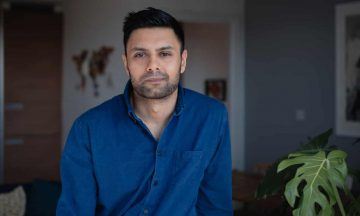Ashish Ghadiali in The Guardian:
 There’s a trope of the British Asian identity narrative, once captured with such originality and brilliance in Hanif Kureishi’s Buddha of Suburbia and much replicated – in Monica Ali’s Brick Lane, for example, or Ayub Khan-Din’s East Is East – that now fills most British Asians of my generation (I’m 40) with dread. It’s the one about the second-generation immigrant held back by the ignorance of parents or a community that’s either comically absurd or violently fundamentalist. Against this backdrop, the second-generation hero or heroine emerges once they find the strength to stand apart from this reactionary past and assimilate into the mainstream of British life.
There’s a trope of the British Asian identity narrative, once captured with such originality and brilliance in Hanif Kureishi’s Buddha of Suburbia and much replicated – in Monica Ali’s Brick Lane, for example, or Ayub Khan-Din’s East Is East – that now fills most British Asians of my generation (I’m 40) with dread. It’s the one about the second-generation immigrant held back by the ignorance of parents or a community that’s either comically absurd or violently fundamentalist. Against this backdrop, the second-generation hero or heroine emerges once they find the strength to stand apart from this reactionary past and assimilate into the mainstream of British life.
This narrative certainly had its time, but we have come to dread it, because through it we dehumanise ourselves and demean the journeys that have made us who we are. It’s also a lie, since no degree of immigrant assimilation can overturn the racism that is systemic in British life, and that our mainstream culture has the habit of perpetuating.
For me, the potted biography on the dust jacket of Mohsin Zaidi’s book (subtitled A Memoir of a Gay Muslim’s Journey to Acceptance) was enough to provoke the first stirrings of that familiar sense of foreboding. Here we learn that the author, raised in a “devout Muslim community”, was the “first person from his school to go to Oxford University” before going on to become, an accomplished criminal barrister, a board member of Stonewall, the UK’s biggest LGBT rights charity, and a governor of his former school in east London. It’s only a blurb, but there is a subtly Islamophobic framing here that opposes Zaidi’s “devout Muslim” background with the progressive attainment of his life and career.
More here.
